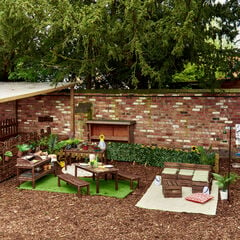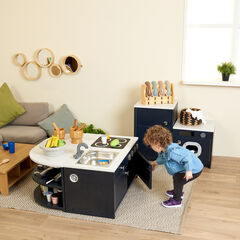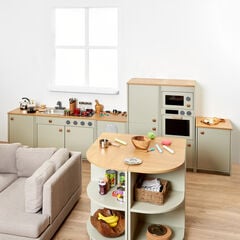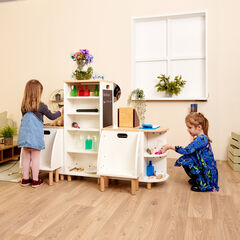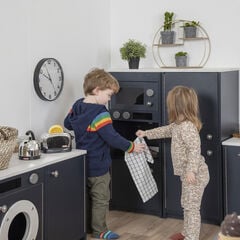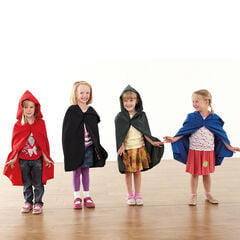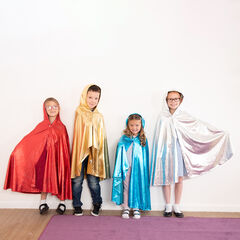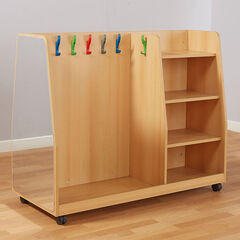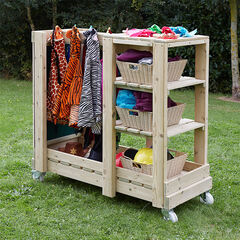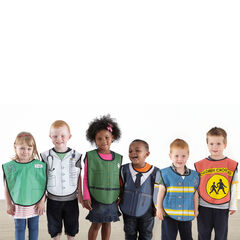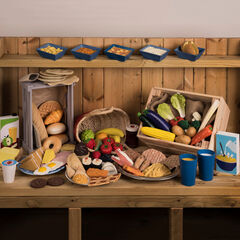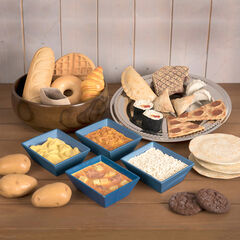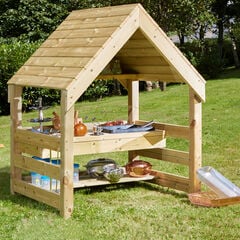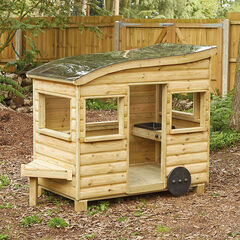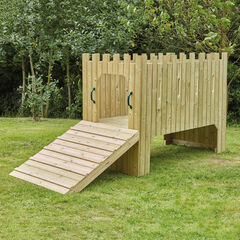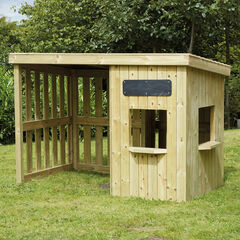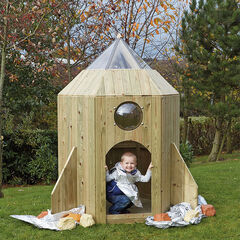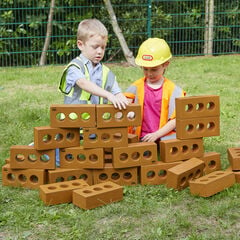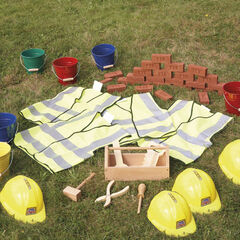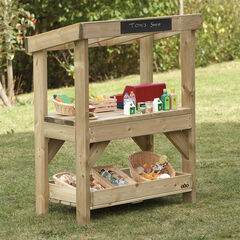As an Early Years practitioner, ever found yourself in the supermarket after a long day at work to find everyone staring at you, with you wondering why? Suddenly, it dawns on you that you are still wearing role play accessories made for you by the children – a paper cape cellotaped to your back, a painted homemade necklace hung around your neck and a strip of paper around your wrist which is really a secret laser watch in disguise!

Although this may look a little strange to the adults in the supermarket, stepping into different roles and characters, for example, a mighty superhero preparing to save the day, provides young children in early years with opportunities to develop their imagination, social skills, and understanding of the world around them. This is the imaginative world of Role Play.
In this blog, we will delve further into the world of role play and think about the following areas:
- The importance of role play in early childhood education and the skills it can develop
- Tops tips for encouraging this type of play in your setting
- Examples of different types of role play activities
- Resource ideas
- Assessing learning through role play and what to look for
What is role play?
As the name suggests, role play is a type of play where children take on different roles and act out various scenarios. This could be anything from pretending to be a doctor, teacher, firefighter, or even a unicorn, fairy or fierce dragon. Through role play, children get to explore different experiences, emotions, perspectives and attempt to understand all of these by recreating them on their terms and in a safe environment.
The importance of role play in early childhood education and the skills developed
Although role play can be exciting, it is not just about fun and games; it plays an important role in a child’s development. This type of play allows children to learn and develop many skills. Here are some of the different areas and key benefits:
Imagination and Creativity
With imagination the world is a much more colourful place to live. We can visit places yet to be explored, become whoever we wish for a brief moment in time, and get to test out scenarios that we are yet to encounter.
When children engage in role play, they use their imaginations to create stories and situations. This imaginative play helps children to think creatively and develop problem solving skills. They learn to come up with new ideas and think outside of the box. They are also given opportunities to walk in the shoes of others. This type of play allows them to experiment with language and ideas observed in the adult world and use their imaginations to project these into their world of play.
“Imagination is the treasure chest where ideas are born and dreams take flight.”
Unknown
Social Skills
Role play often involves interaction with other children. This interaction helps children develop important social skills such as communication, cooperation, and empathy. They learn to listen, take turns, share, and work together to create and act out stories. Through role play, children also learn to understand and express their own emotions and respond to the feelings of others.
When acting out scenarios in the home corner, they may be negotiating who is going to complete a certain task. When more than one child wants to play the same role, they learn to compromise or develop conflict-resolution skills. If there is a major problem to be solved in outer space, little astronauts may be seen using teamwork and talk to work out a solution.
Language and communication skills
During role play, children use language to communicate their ideas and thoughts and ask questions. They practise new vocabulary, sentence structures, and conversational skills. This helps build their language and communication skills, which are vital for their overall development, academic success and life in general. Children not only learn to empathise when taking on a role but learn to read body language and non-verbal cues. Role play is a great way to practise those important skills surrounding language and communication, and oracy.
Emotional development
Stepping into different roles allows children to explore different emotions and experiences in a safe and controlled environment. They can act out situations that may be confusing or scary in real life, helping them to understand and manage their emotions. For some children, they may use role play as a practise run for a real life event. This may be pretending to visit the dentist or doctor. They may even act out situations such as getting into trouble at school or solving a conflict with a friend to see what it feels like and to practise a response.

Problem-solving and critical thinking
When children engage in this type of play, they often encounter various challenges and problems that they need to solve. This encourages them to think critically and come up with solutions to different situations. They learn to make decisions, evaluate different options, differentiate between right and wrong, and understand the consequences of their actions.
Tips for encouraging role play in your setting
So, what can we do to encourage role play in our settings? Here are some tips for facilitating role play in an early years setting:
Creating role play areas
Setting up role play areas in your setting can provide children with opportunities to engage in role play throughout the day. These spaces may include a home corner, doctor’s office, grocery store, construction site or a designated area where all the resources live so that the children can access them independently and make their own decisions about their play. Each scenario can be equipped with props and materials related to the theme, allowing children to explore and play in different roles.
Using generic furniture such as the Modern Living Role Play Units provides flexibility as it can be configured in multiple ways and can be customised according to theme or the needs and interests of the children in your setting.
For the role play to have the best outcomes, remember to get the children involved when creating the space, follow their interests and allow them to have some ownership and input. Another top tip is to make sure that the children have some experience of the theme (if using one) with some pre-defined objects available as they might find it difficult to act out scenarios they have never encountered or find it difficult to pretend that one thing is another. Not every child finds it easy to be imaginative. Using your knowledge of the children and knowing their interests ensures that there are role play opportunities for everyone.
Create a safe and supportive environment
Creating a safe and supportive environment is essential for encouraging role play. Allow children the freedom to explore and express themselves without fear of judgement. Provide guidance and support when needed, but also give children space to lead their own play. Also, create a safe space for adults. Not all adults find it easy acting out different roles and can feel self conscious. Have a go and don’t be harsh on yourself. The children will just be happy that you are joining in (if invited) and value this type of play.
Encourage collaborative play
Encouraging collaborative play can help children develop their social skills, help them to solve conflicts and learn to work together. Provide opportunities for children to engage in role play with their peers and incorporate activities that promote cooperation and collaboration.
Ensure flexibility wherever possible
Children’s imaginations can be limited or limitless (depending on experiences etc), so make sure the space is adaptable. Allow children to incorporate or move items around, or re-purpose props as needed. Some children may want to bring in related items from home or make pictures/charts/diagrams in the creative area to go on the walls.
Be an active observer and participate
Observing and participating in role play can provide valuable insights into a child’s development. Take the time to watch and listen to the stories and scenarios children create. Join in the play when appropriate, and use it as an opportunity to connect with the children. This is an ideal opportunity to model new language/vocabulary, and to introduce a new challenge or support their learning.
Role play is important for all children in Early Years but if you are interested in finding out more about toddlers and role play, why not read our blog, ‘Role Play areas for toddler rooms’.
Examples of different types of role play activities
Role play can be used to integrate different areas of learning and to teach different skills. Below are a few examples of different scenarios.
Grocery store or market stall
- Learn about maths – counting money, weighing items.
- Language – reading labels, asking questions, learning the names of different items.
- Understanding of the wider world – learning about the roles of different members of the community.
- Personal and social skills – being polite and using our manners when asking or enquiring about something.

Doctors’ surgery or vets
- Measures – measuring height/length and finding the right sized plaster/bandage needed.
- Science – learning about different parts of the body and the importance of a healthy lifestyle.
- Social and emotional skills – empathising with patients and looking after one another.

Construction site
- Maths – understanding of shapes, sizes and measurements during construction tasks.
- Understanding the world – exploring real-world roles, tools and teamwork.
- Physical development – developing and strengthening different muscles and movements as they stretch, lift, pull and push.
- Creativity and Imagination – planning, designing and constructing structures, exploring new ideas and testing through trial and error.
For more tips and ideas on creating a construction site in your setting, read our blog, ‘Busy builders construction site role play’.

Puppet shows
- Literacy skills – children can create or use puppets and theatres to make up a new narrative or reenact a favourite story, ready to repeat or adapt it in their assumed role. Why not perform an outdoor puppet show, creating role play opportunities for those who like spending time outside?
- Listening and attention – children practise being a good audience whilst watching their friends puppet shows.
- Creativity and imagination – designing characters and props to act out different roles and scenarios.
Domestic role play
Many children enjoy engaging in domestic role play as these are the roles that they often have the most experience of.
- Roles and responsibilities – sharing tasks, helping one another, understanding why we have to do certain household task such as cleaning, or looking after the baby
- Maths – weighing, sorting and counting out ingredients when cooking.
- Writing – writing shopping lists to pin on the fridge, jotting dates down on a calendar, reading food labels or writing a birthday card for someone.
- Science – learning how to keep healthy, for example, brushing our teeth, eating a balanced diet and basic hygiene.
- Understanding the world – acting out different celebrations such as birthdays or different festivals.
For more tips and ideas on creating a home corner in your setting, read the blog, ‘The Importance of a Home Corner’ written by Alice Sharp, or click on the following link to read about Playing with Dolls in Early Childhood.
Resource ideas for role play
Most resources can be used for role play, especially in symbolic play where one object becomes another, for example, the wooden blocks may become pasta being stirred in the pan on the stove or a mobile phone. However, certain resources lend themselves well to this type of play. Here are a few ideas:
Costumes and dressing up
Basic dressing up resources such as hats, coats, bags, purses, aprons, scarves and different lengths of materials can inspire children to step into different roles without being too restricted. However, some children who are just starting to develop imagination will want to transform into an astronaut or firefighter with more pre-defined (ready-made) outfits. Providing a variety of costumes and props allows children to dress up and take on different roles. This could include dressing up to represent different occupations within the community, animals, or characters from their favourite stories.
Props
Everyday objects, both real and pretend, can enhance the realism of role play. Items like pretend food, stethoscopes, cash registers, and building tools can support a wide range of scenarios and immerse the children in the roles they are acting out. As imaginations soar, children may have the creativity to create such things but others may need some support with real items being available.
Books and story prompts
Story prompts, books and story sacks that feature familiar role play themes and information based on the children’s interests can inspire children’s play and give extra ideas. Just think about how many children have walked through the pretend (or real) long wavy grass to find the bear at the end of the journey.
DIY materials
Don’t overlook the power of simple DIY resources. Old cardboard boxes, sticks, fabric scraps, and recycled materials can be transformed into many things that the children can use in their play or use to create homemade props.
Outdoor props
And let’s not forget the importance of taking role play outdoors. For outdoor role play, add items like tents, dens, ropes, shovels and magnifying glasses for explorers. Children can use the natural environment to create outdoor role-play scenarios such as digging for fossils or treasure, camping under the stars, or running a forest café. Why not extend the indoor home corner into the outdoor area by adding outdoor role play furniture such as a patio area with furniture, outdoor waterproof lanterns and maybe even a pretend BBQ, fire pit, or pizza oven?
Role play panels
A perfect addition to any environment. Whether transforming a space into a kitchen, travel agent, garden centre, farm or shop, a panel can add character and offers a creative back drop for children’s play.
Assessing learning through role play – What to look for?
Role play is an engaging learning experience but is also a great and valuable tool for assessing children’s development. Here are a few questions to ponder on when observing children in your setting?
- Language use – Are children using new vocabulary? Are they able to string sentences together and articulate their thoughts within the role play scenario?
- Social interaction – Are children working together, taking turns, and solving conflicts within their roles?
- Creativity and problem-solving – Are children thinking critically to solve problems within the role play environment? Are they using their imagination to create new ideas?
- Emotional expression – Are children using role play to explore and express their emotions, whether positive or negative?
Stages of role play
What type of play are the children engaging in? Are they imitating others or are they the onlooker watching their peers? Some children may choose to play alone or engage in parallel play. As children progress, they will start to cooperate and collaborate. Although we can often see a general development in role play, development will be richer and more complex with collaboration taking place sooner if imaginative play is encouraged, modelled and valued within the setting.
Conclusion
So, if role play provides children with opportunities to develop imagination, social skills, language and problem-solving skills, then what are we waiting for? Wear your paper cape and pasta necklace with pride. Let’s show children that role play is a valued part of our learning and play, and that with a sprinkle of imagination, we can be transported anywhere. Not only does it allow us to have fun, but helps us to practise different situations, empathise with others and can make the impossible possible – all key skills for future life.

Written by Michelle Reid. Michelle is a mum of one and has over 20 years of experience working as a nursery nurse and qualified teacher in the Early Years and Primary sector.























